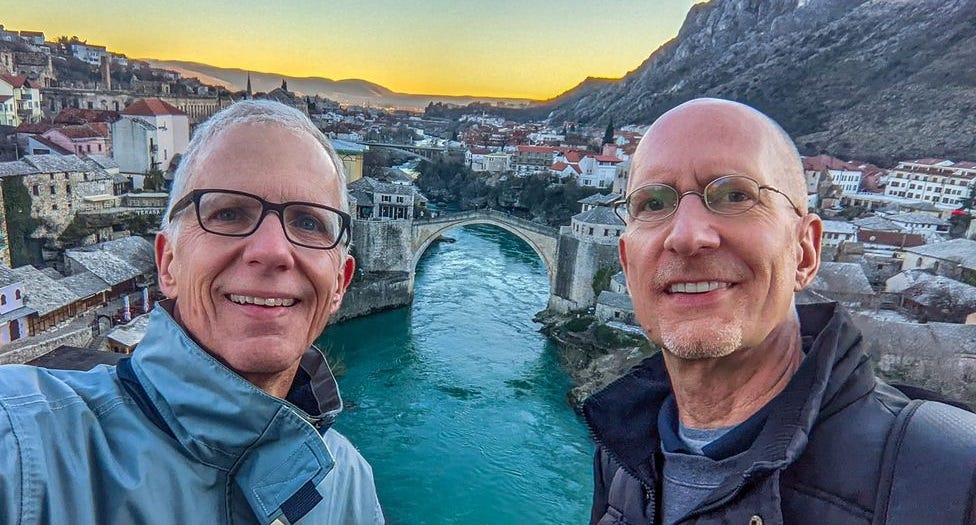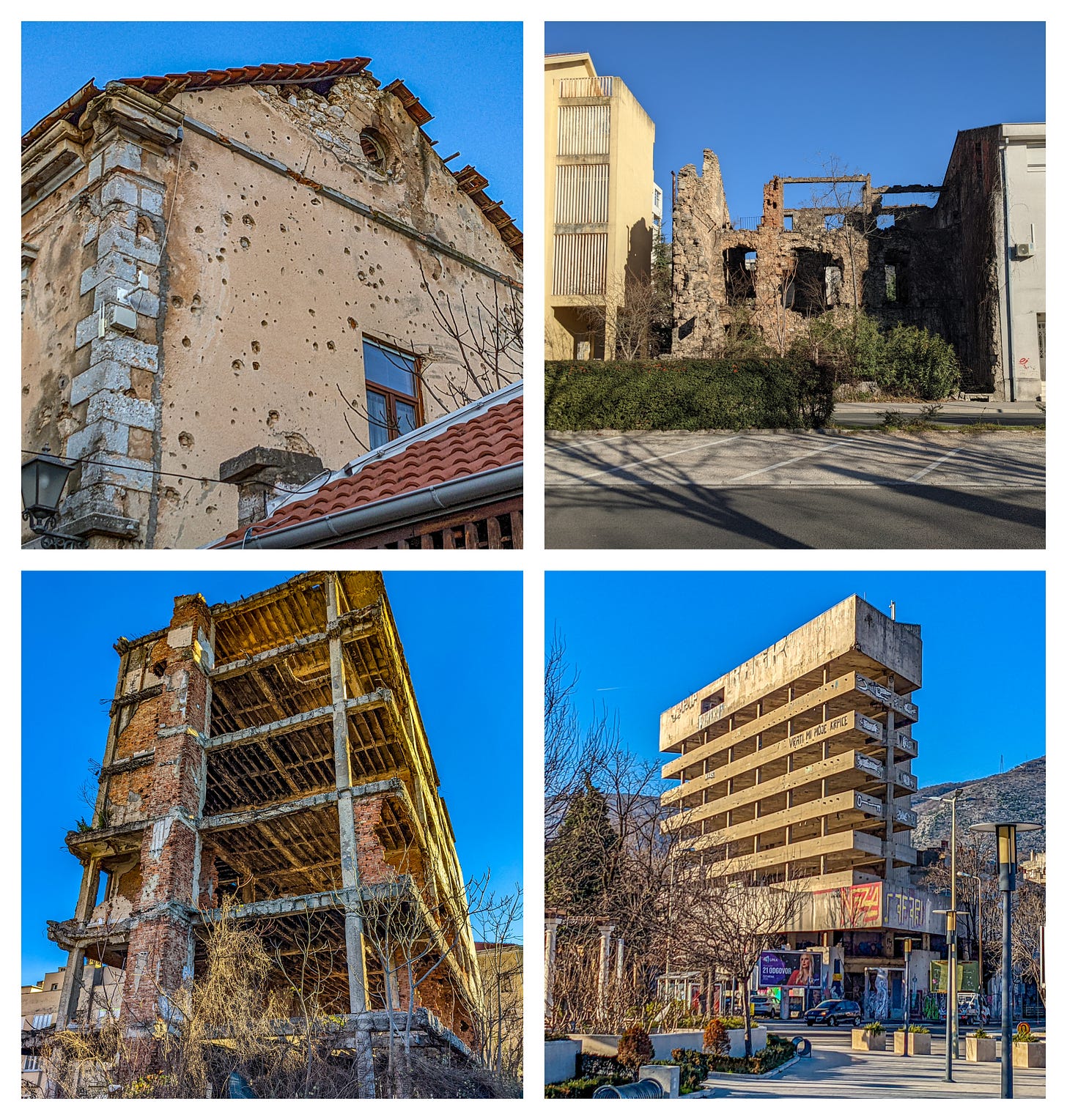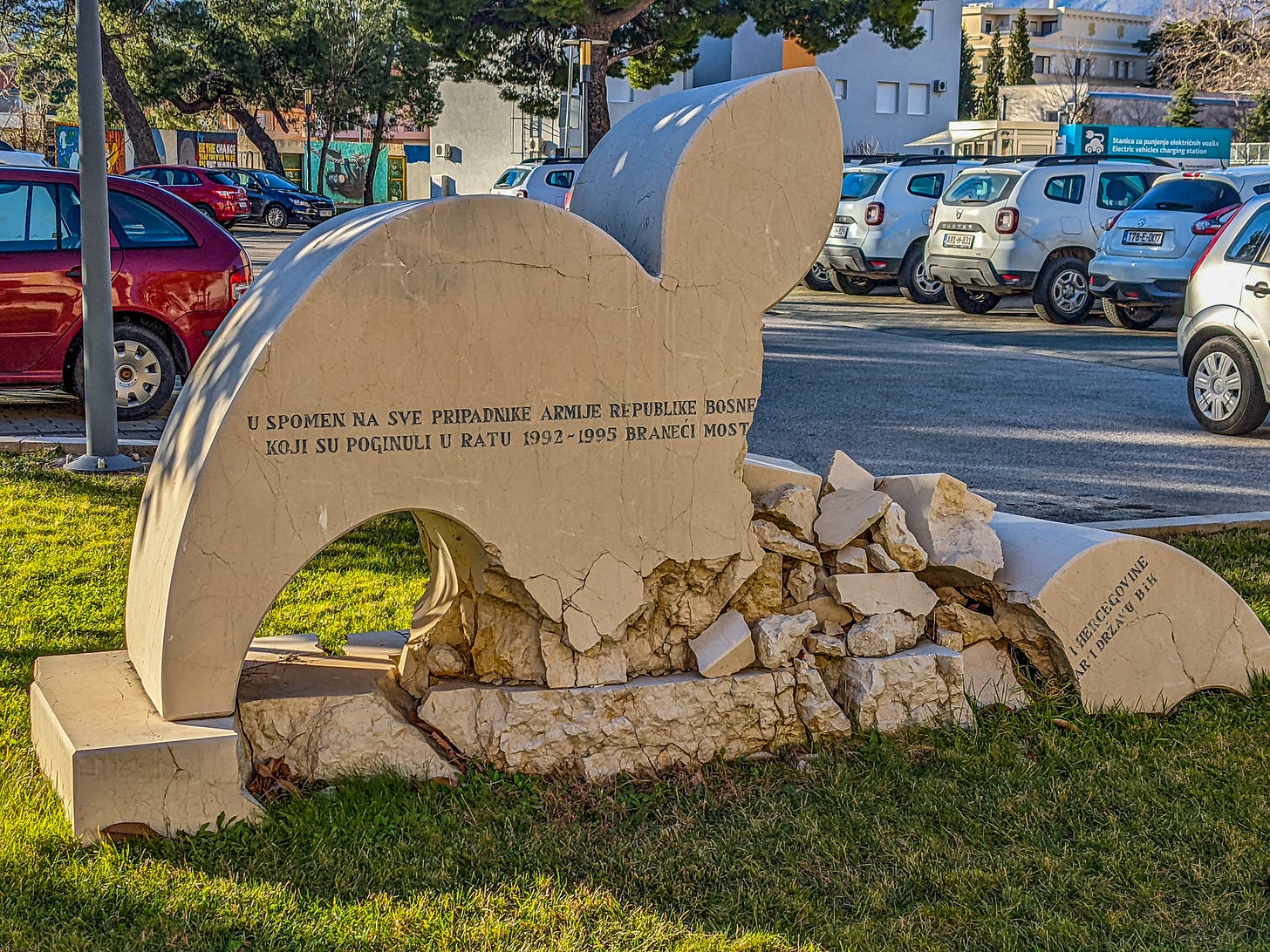Please Stop Saying Civil War is Inevitable in the United States
A lot of people think it is, and it wouldn't be that big a deal. But a recent trip into Bosnia and Herzegovina gave me some well-needed perspective.
Lately, I’m hearing a lot of people say that civil war seems almost inevitable in the United States — and that maybe it’s not the worst thing that could happen.
I recently got a peek into that possible future, and now I confess to being even more annoyed with all the people who talk like civil war in America wouldn’t be that big a deal.
Two weeks ago, Michael and I traveled to the city of Mostar in Bosnia and Herzegovina, one of the countries that borders Croatia, where we’re living for the winter.
Mostar endured very heavy fighting during the Bosnian War in the 1990s — a war in this area that was actually two different wars, one between the Serbs and an alliance made up of Croats and Bosniaks, and another between the Croats and Bosniaks after the Serbs were defeated.
Decades later, the war is over, but the city is still very divided between ethnic Croats and Bosniak Muslims — so much so that the children attend the same physical school but attend different classes at different times.
Everywhere you look, you see evidence of the old wars. Bullet holes riddle walls. Bombed out buildings have been left to crumble into the weeds. Sometimes the wreckage is left festering between newer buildings, but occasionally it takes up entire city blocks.
One of the most chilling of the abandoned buildings is Sniper Tower — formerly the parking garage to a bank but turned into the perfect vantage point for snipers during the war, who then proceeded to terrorize the entire area, even killing civilians, for months on end.
Bosnia and Herzegovina is a poor country, which is why more of this wreckage hasn’t been cleared away. But the result is the whole city has become a morbid if fascinating monument to the very concept of war — and the long-lasting damage of violence as a way to settle political disputes.
All these years later, that violence still haunts the entire city.
It’s a cliché to say about conflicts like the Bosnia War that all sides acted horribly. But that’s literally the nature of war. It’s just about the worst thing that human beings can do — in part, because it unleashes forces that can’t be controlled.
At the same time, I’m fully aware that there are truly bad people in the world — people like Slobodan Milošević — and that sometimes there is no alternative to war, at least as a very last resort. Like so many things in life, this issue is complicated.
But that’s not the way many people in America sound these days when they talk about civil war, which now seems like a real possibility.
We’re basically already in a civil war anyway! people casually say, even though that's absolutely not true about America.
And while we’re at it, I might as well add I’m not thrilled with people saying things like, The liberal states should just secede! That would solve all our problems.
I know people are just venting but even so: dividing up land is just about the most difficult task humans can ever do. What exactly do we do with the people who don’t want to leave territory no longer controlled by their “side” — or who do want to join the secession but live on the wrong half of the new border?
Look, I get it. The January 2021 insurrection was unprecedented in American history — and it’s horrifying how almost the entire Republican Party is currently setting the stage to undermine future elections. America’s allies are starting to see our democracy as a joke.
I still can’t quite process that, after four years of the Trump Shitshow, even more Americans voted for him the second time around.
It’s also true that America’s past is no bed of roses. There are a lot of things to be aggrieved about, especially if you or your ancestors were the object of state-sanctioned violence.
But it’s still not okay to think that more violence is acceptable, at least under certain circumstances, which one-third of Americas now think — a number that is way up from the eight percent who thought that in 2017.
It upsets me when progressives try to excuse left-wing political violence — or try to “cancel” those who speak out against it on moral or strategic terms.
But let’s face it: America’s dark turn is primarily being driven by the right. By an almost two-to-one margin, Republicans (at 40%) and Independents (at 41%) now see violence as sometimes acceptable, compared to only 24% of Democrats.
It’s absolutely not fair that left-leaning folks are being asked — yet again — to be the “responsible” ones and rise above the cynicism and nihilism of so many on the right.
But the fact remains, America is heading in a very dark direction. You know what’s worse than having to step up and be the responsible one all the time?
Actual civil war. And more violence.
The problem with political violence — with all violence — is that it really can’t be controlled. You think you’re only targeting your political enemies, the people who “deserve” it, but these things have a way of getting out of hand.
Before you know it, unambiguously innocent people are being hurt. If your movement didn’t do everything it could to discourage the violence before it happened, you own the awkward, unjust result.
And your movement loses a little bit of its moral authority, and the issues you care about become a little bit less likely to happen.
This road you’ve chosen? Not too far down it waits the parking garage of a bank that becomes known as Sniper Tower.

So is there any way for America to turn back from this dark possible future before it’s too late?
Traveling throughout the Baltic Peninsula this year — and living for months at a time in quasi-or-outright-authoritarian countries like Hungary and Turkey — I’ve read a lot about the rise of fascism.
Why do some countries fall to it — and why have a few countries managed to fight it off?
One compelling theory says that the only way countries have ever fended off fascism was when the entire rest of the country united to fight the extremists. Everyone worked together to defeat the bad guys — even if it means the good guys had to temporarily put their other differences aside.
Does that sound like what’s going on in America right now? Are the far left, the center-left, and center-right doing everything they can to find common ground with each other and keep their eyes on the real enemy — the people who would destroy our democracy?
Or are they hopelessly divided and attacking each other, like the left in Germany during the slow rise of the Third Reich?
Sure, a lot of people talk like fascism and civil war are imminent, like we’re experiencing a five alarm fire, but they don’t seem very interested in doing the one thing that might actually put the fire out: persuading the persuadable and trying our damnedest to create more allies.
What’s the point? We’re already in a civil war, right? And a simple little secession would easily solve all our problems. The other side’s all crazy anyway.
So it’s easier to rant on social media to the people who already think exactly like you and try to shame or cancel anyone who disagrees.
Yeah, sure, that’ll work.
Again, the burden placed on the opponents of extremism is not fair.
But if the rest of us have any hope of uniting the non-rabid majority of America against these folks, it won’t be by giving into our own worse impulses.
We can’t retreat into cynicism — and its close sibling, defeatism. The answer to right-wing extremism is not left-wing extremism. It isn’t helpful to say that America is already fascist — and always has been. Or that America isn’t a democracy. The subtext to all this is: So what’s the point of even trying to save it?
Which isn’t to say we should act like it's business as usual. America has plenty of flaws that desperately need fixing.
But “flawed” isn’t the same as “fascist.” And democracies don’t need to be perfect to be democracies — which is a good thing since no democracy in the history of the world has ever been perfect.
Disagreement and debate are always okay, even within movements. But it has to be in good faith. Toxic score-settling and scorched-earth purity politics may literally be the death of us all.
For the time being, America isn’t done. And I’m not ready for it to go the way of Bosnia and Herzegovina without a (non-violent) fight.
During our trip to Mostar, we hired a guide to take us around town. At one point, he showed us a monument to the Muslim soldiers who fought in the war.
In 2013, it was blown up by angry Croats. But the government couldn’t afford to replace it, so they simply reassembled the wreckage:
I couldn’t help but think that this new version of the memorial captures an essential truth about the Bosnian War — and all war. This particular truth is more awkward and painful than what the monument might have communicated before, but it’s also more real.
And boy, has it made me think about the current cultural and political meltdown in America, and my frustration that too many people don’t seem to be taking the threat of fascism and even civil war nearly seriously enough.
What's the harsh truth this new incarnation of the war memorial reveals?
That it’s fairly easy to blow things up, whether it’s a memorial or a country.
It’s a hell of a lot more difficult to put the pieces back together again.
Brent Hartinger is a screenwriter and author, and one half of Brent and Michael Are Going Places, a couple of traveling gay digital nomads. For more about Brent, visit him at BrentHartinger.com.





Love this piece, guys. Thanks for prompting me to think about the situation in the US, where I'll be heading back out to next month!
Your points are excellent. How sorry I am that we who are moderates can't seem to break through the extremist talk. I try every day.